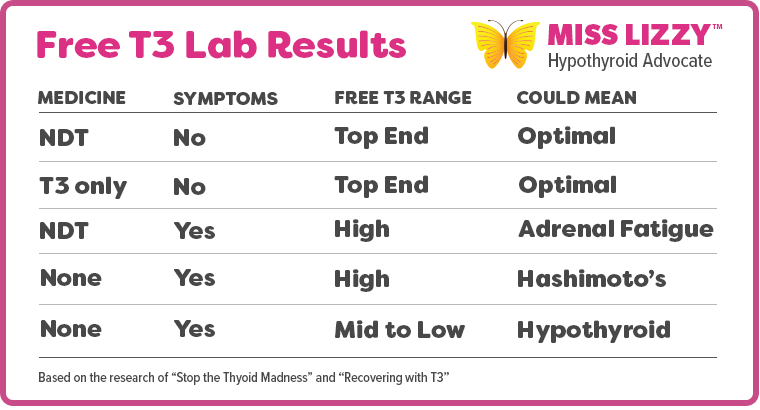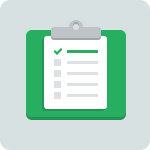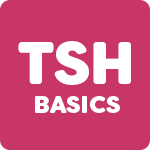It’s important patients order the right lab tests for hypothyroidism, adrenal fatigue, and related conditions, otherwise, patients may go untreated. While TSH test has been used as the main test for hypothyroidism over recent years, it is not a reliable measure of thyroid function. Below is a list of lab tests recommended by patients and doctors. 1 2 3 4.
PRIMARY LAB TESTS for HYPOTHYROIDISM
The following is a primary list of lab tests for hypothyroidism run by my doctor. These lab tests provided a baseline for diagnosing hypothyroidism and related conditions. In addition, these primary lab tests are the ones we run regularly to monitor my thyroid health. To help monitor and assess treatment, I find it helpful to track lab test results, body temperature and medicine doses.
FREE T3 Lab Test
Free T3 is the workhorse of all thyroid hormones, measuring the free, unbound levels of triiodothyronine in the bloodstream. It’s important to remember that Free T3 is considered more accurate than Total T3. In hyperthyroidism Free T3 is typically elevated. In hypothyroidism, Free T3 is typically low. 5
According to Stop the Thyroid Madness 6, at the optimal dose of natural desiccated thyroid, with no lingering hypothyroid symptoms and with healthy adrenals, patients tend to have a Free T3 at the top of the range.
On natural desiccated thyroid (lower than 3 grains), with the Free T3 high or above range, and continuing hypothyroid symptoms or even hyper-like symptoms, patient could have adrenal fatigue.
For patients who are not on thyroid medication, a lab test showing high Free T3 could mean they have Hashimoto’s disease or Graves disease. Whereas for patients who are not on thyroid medicine and have hypothyroid symptoms, a lab test showing Free T3 mid to lower range could mean hypothyroidism.

FREE T4 Lab Test
Free T4 measures the available and unbound T4 hormone. For patients on natural desiccated thyroid medicine with healthy adrenals, a normal lab test will show Free T4 at mid to high range, and Free T3 at the top end of the range. Hypothyroidism generally occurs with Free T4 in the low range, and Free T3 at mid-range or slightly high.
Reverse T3 (RT3) Test
The RT3 test must be done at the same time as the Free T3 in order to calculate the ratio with the results and measurements. According to Thyroid-Rt3.com, divide Free T3 by reverse T3. The amount should be 20 or greater. If it’s less then that you have a RT3 problem. If it’s vastly smaller or larger you may have to move the decimal point to get the units right.
FT3 should be twenty of more times higher than RT3. (Stop the Thyroid Madness book page 162-163 for more.)
24-Hour Cortisol Saliva Test for Adrenal Fatigue
This lab test is done at home to evaluate cortisol levels during a 24 hour period. This test helps patients determine if they have adrenal fatigue. In addition the lab test will show the times during the day when adrenal function is too high or too low. Patients with healthy adrenal function will have the follow results:
- 8 am will be at the very top of the range
- 11 am-noon in the upper quarter of the range
- 4-5 pm will be mid-range
- 11 pm to midnight at the very bottom of the range
It’s important to remember, the rise and fall pattern of cortisol reflects the a person’s energy throughout the day. In simple terms, we have more energy in the morning, yet as the day goes on our energy tappers down slowly until bedtime. When the cortisol pattern is off, it greatly affects our energy and sleep patterns in the following ways:
- Low morning cortisol may make it hard to wake up, especially before 9 AM.
- Low afternoon cortisol may cause patients to require a nap.
- High bedtime cortisol may make it hard to fall asleep.
Two weeks prior to the 24 hour saliva test, make sure to stop all adrenal supplements.
Order the 24 Hour Saliva Test from TrueHealth Labs
Antithyroglobulin Test
According to About.com, testing for thyroglobulin antibodies (also called antithyroglobulin antibodies) is common. If you have already been diagnosed with Graves’ disease, having high levels of thyroglobulin antibodies means that you are more likely to eventually become hypothyroid. Thyroglobulin antibodies are positive in about 60 percent of Hashimoto’s patients and 30 percent of Graves’ patients.
B-12 Test
According to Stop the Thyroid Madness, B12 can can be low in hypothyroid patients due to low stomach acid. The normal range for B12 is 200-900 pg/ml. Though Stop the Thyroid Madnesss indicates a healthy range is on the high end.
Ferritin
The ferritin test measures the level of ferritin, the major iron storage protein in the body 7. The results may vary slightly among laboratories, but in general, normal ferritin levels are 12-300 nanograms per milliliter of blood (ng/mL) for males and 12-150 ng/mL for females.
According to Stop the Thyroid Madness, if your Ferritin result is less than 50, your levels are too low and can be causing problems…as well as leading you into anemia as you fall lower, which will give you symptoms similar to hypo, such as depression, achiness, fatigue. Optimally, females shoot for 70-90 at the minimum and men 100-130.
Elevated Ferritin, can indicate inflammation, rheumatoid arthritis, liver disease, hyperthyroidism, adult Still’s disease, type 2 diabetes, leukemia, Hodgkin’s lymphoma, iron poisoning or frequent blood transfusions.
For at least 12 hours before testing and as much as 5 days before testing, stop taking iron supplements for best accuracy.
Iodine Loading Test
While iodine is an important nutrient for thyroid and whole body health, iodine deficiency is a primary cause of Hypothyroidism. Learn more about iodine. In The Iodine Crisis by Lynne Farrow, the 24 Hour Iodine Loading test is recommended for assessing iodine sufficiency.
People undergoing the test are deemed to be deficient in iodine if they excrete less than 90% of the iodine loading dose. 8
Sodium Test
The sodium test is often part of the Basic Metabolic Panel. The right amount of sodium is important for health. Blood sodium can also be part of an electrolyte panel.
Normal results for this test are 135-145 mEq/L 9, however Stop the Thyroid Madness noted that healthy folks report 142 and even slightly higher.
Thyroid Peroxidase Antibody (TPO) Test
The TPA antibodies work against thyroid peroxidase and the enzyme that plays a part on the conversion of T4 to T3. TPO antibodies can indicate Hashimoto’s disease. In 95% of patients with Hashimoto’s thyroiditis TPO antibodies are detectable. While in 50-80% of patients with Graves disease TPO antibodies are detectable. 10
TSH Lab Test
TSH is a measure of the pituitary function, therefore it is not an accurate measure of thyroid function. Learn more about why TSH can be unreliable. Here is how TSH can be used in thyroid treatment to:
- Help determine hypothyroidism only if it’s in the high range.
- Understand the relative range for you.
- Diagnose a pituitary problem, not a thyroid problem. Especially if low TSH is accompanied by low Free T3.
Vitamin D test
As explained by Dr. Mercola 11, there are two vitamin D test. The 1,25(OH)D and the 25(OH)D. The correct test is 25(OH)D, also called 25-hydroxyvitamin D. The lab test ranges for 25-hydroxyvitamin D are:
- Deficient > 50 ng/ml
- Optimal 50-70 ng/ml
- Treating Cancer and Heart Disease 70-100 ng/ml
- Excess > 100ng/ml
Low vitamin D can contribute to thyroid problems 12.
Serum Iron
According to Healthline 13, the serum iron test measures how much iron is in your serum. This test can help your doctor figure out if there is a problem with your iron levels (high or low) resulting in symptoms such as fatigue, weakness, difficulty concentrating, and moodiness. Though its a less common test.
Stop the Thyroid Madness suggests a value of about 110 for women, and the 130′s for men, based on what they’ve seen on hundreds of lab results. 14
TIBC (Total iron binding capacity) test: measures whether a protein called transferrin, produced by the liver, has the ability to carry iron in the blood. Used to determine anemia or low body iron. If your result is high, and in the absence of chronic disease, you may be anemic. With healthy amounts of iron, this test will be low in the range—about 1/4th above the bottom number.
SECONDARY LAB TESTS
Aldosterone
Aldosterone is a hormone that is produced by the adrenal glands to help maintain the balance of fluids and electrolytes in our bodies through the kidneys. In addition, aldosterone affects blood pressure, as well as regulating salt (sodium) and potassium in the blood. If aldosterone production is not functioning properly, there can be serious consequences to the heart, kidneys and electrolyte balance. 15
According to GlobalRph.com 16, the normal range for Aldosterone is 4-31 ng/gl. Low range results indicate adrenal insufficiency.
Stop the Thyroid Madness suggests for women to test aldosterone in the first week of the menstrual cycle, or up until the beginning of the second week. This phase of the menstrual cycle is when progesterone is at its lowest. By the end of the second week in the menstrual cycle progesterone begins to rise. Progesterone can falsely drive up aldosterone.
DHEA test
DHEA is a natural steroid and precursor hormone produced by the adrenals. The truth is that — for the women who need it — adrenal support with DHEA supplementation can make a big difference. I’ve seen it help patients get going again when they feel like they’ve hit rock bottom. But it’s never as simple as just popping a pill. For me personally, supplementing with DHEA was not the right fit but for others it can be effective. On WomentoWomen they like to see estrogen, progesterone, and DHEA in the upper quadrant of normal.
Folate Test
Folate or Folic acid, is a b-vitamin which can be low in hypothyroid patients. The normal reference range of folic acid in the blood is 2.7 to 17.0 nanograms per milliliter (ng/mL). Low levels of folic acid may indicate anemia, malabsorption, or malnutrition. 17
RBC Magnesium Test
While a lack of magnesium in normal diets can cause low thyroid function, it can be solved with proper diet and supplements. Magnesium deficiencies are common, especially in well-developed countries where processed foods are a part of the diet. Seven out of every ten Americans is likely to have a magnesium deficiency, causing many problems including underactive thyroid (hypothyroidism). 18
Signs of magnesium deficiency include weakness, extreme thirst, muscle cramps, muscle twitching, poor memory, confusion, Type II Diabetes, high blood pressure, fatigue, anxiety and more. 19
For RBC Magnesium results, Stop the Thyroid Mandess suggests a good range is mid to high. 20
Renin Lab Test
Aldosterone and renin tests are used to evaluate if adrenal glands are producing appropriate amounts of aldosterone. The test is also used to distinguish between the potential causes of excess or deficiency. Aldosterone may be measured in the blood or in a 24-hour urine sample, which measures the amount of aldosterone removed in the urine in a day. Renin is always measured in blood.
Low renin can mean primary aldosteronism (Conn syndrome) or Cushing Syndrome. While high renin can mean Secondary aldosteronism, or Adrenal insufficiency. 21
Zinc
The plasma zinc test can establish zing deficiency. While the plasma zinc test is good at detecting major zinc deficiency, it is not as good at catching minor zinc deficiency. When this happens, a patient can have “normal” zinc results but still be zinc deficient. The optimal range for plasma zinc is 3.8 – 22.9µmol/L ( 90-150µg/dl).
ACTH STIM
The ACTH Stimulation test assesses the function of adrenal glands stress response to ACTH (adrenocorticotropic hormone). This test is used to diagnose primary or second adrenal sufficiency, Addison’s disease, and related conditions. 22
For details about range, see the simple diagnostic chart.
T7, Total T3, Total T4, Uptake, or any other thyroid labs
These tests are unnecessary 23
When talking with a good doctor, it’s important to know which lab tests for hypothyroidism and track the results over time!
Notes:
- StoptheThyroidMadness.com ↩
- The Iodine Crisis by Lynne Farrow ↩
- Adrenal Fatigue by Dr. James L. Wilson ↩
- Mary Shomom at About.com ↩
- http://thyroid.about.com/od/gettestedanddiagnosed/a/bloodtests.htm ↩
- StoptheThyroidMadness.com ↩
- http://www.medicinenet.com/ferritin_blood_test/article.htm ↩
- http://www.townsendletter.com/Jan2013/iodine0113.html ↩
- http://www.healthline.com/health/sodium-blood#Results ↩
- http://thyroid.about.com/od/gettestedanddiagnosed/a/bloodtests.htm ↩
- http://articles.mercola.com/sites/articles/archive/2002/02/23/vitamin-d-deficiency-part-one.aspx ↩
- http://www.wellnessresources.com/health/articles/low_vitamin_d_contributes_to_thyroid_problems/ ↩
- http://www.healthline.com/health/serum-iron#Overview ↩
- http://www.stopthethyroidmadness.com/lab-values/ ↩
- http://pcos.about.com/od/normalmenstrualcycle/f/aldosterone.htm ↩
- http://www.healthline.com/health/aldosterone#Overview ↩
- http://www.healthline.com/health/folic-acid-test#UnderstandingtheResults ↩
- http://www.progressivehealth.com/thyroid-magnesium.htm ↩
- http://naturalsociety.com/16-magnesium-deficiency-symptoms-signs-low-levels/ ↩
- http://www.stopthethyroidmadness.com/lab-values/ ↩
- http://labtestsonline.org/understanding/analytes/aldosterone/tab/test/ ↩
- http://en.wikipedia.org/wiki/ACTH_stimulation_test ↩
- http://www.stopthethyroidmadness.com/lab-values/ ↩















